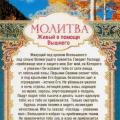- Rubens, Pan and Siringa.
& nbsp & nbsp & nbsp & nbsp Where does the nymph run?
P.P. Rubens. "Pan and Siringa"
- Girl, how beautiful you are! Probably everyone is pestering you?
- Yes.
- And you refuse everyone?
- Yes.
- You will regret!
This anecdote comes to mind when you see the painting "Pan and Siring". Two characters: a furry goat-footed muscular male creature (Pan) and a young maiden (Siringa nymph).
He kind of grabs her, she kind of fights back. In his hands is a transparent cape, which, apparently, was on the girl. She still holds it with her right hand, covering her charms. And the red blanket has almost fallen off, barely holding onto the shoulder.
His intentions are unambiguous: he wants to achieve it. And she doesn't need it at all. His left hand is already embracing the girl, but in reality it is an armful of reeds, a hint of the development of events. It takes place in the swamp thickets (not the most suitable place for love affairs). But - got his love ("You are good, you reeds, sometimes evening!").
Who are they, the characters in the picture? Their story is told by Hermes, who went on the instructions of Zeus to kill Argus and free his mistress Io, whom Zeus turned into a cow (hiding his sins), and then had to present it to his jealous wife Hera (and Hera knew exactly who this cow was! ). A confusing story ... And Hermes with his pipe got to Argus, began to play with the intention to put him to sleep and, answering the question of the half-asleep watchman, where did this magic pipe come from, told him about how Pan chased Syringa, how she was from him ran away, and what came of it all.
Pan is the son of Hermes (in the Greek pantheon of gods - Hermes, in the Roman - Mercury). Hermes is a god, the son of Zeus. But for some reason he decided to earn some money as a shepherd and went for this to Arcadia (Arcadia - the region of Greece). What and why is not clear, but "what happened happened." And how a simple mortal immortal shepherd fell unconscious in love with a nymph who could not resist him ... And here is the time to remember Alexander Sergeevich Pushkin: unknown animal. " The nymph gave birth to a boy: "He was with horns, with goat legs, noisy, laughing" (Homeric hymns, "To Pan").

Rubens, Pan and Siringa. Fragment. Pan
Hermes was a normal child. And he became quite handsome as an adult. How it happened that he had such an unusual son, to put it mildly, is not clear: either he was in too much haste, or the nymph was desperately resisting. But that's how it happened.
Mother, of course, was beside herself:
The mother gasped and jumped up and, leaving the child, ran away:
I was horrified by his bearded, terrible face.
So Pan became orphaned, he no longer heard of his mother and did not meet with her.
But dad, Hermes, was pretty pleased:
Hermes the beneficent quickly took the child into his arms.
He rejoiced very much in his soul, looking at his dear son.
Moreover, he decided to show his son to the Olympic gods:
With him the parent rushed to the dwelling of the blessed immortals,
her son wrapped in the skin of a fluffy mountain hare.
He sat down in front of Zeus, the ruler, between other gods
and showed them the child. The gods rolled with laughter.
Everyone was pleased with the boy - and the boy was named Pan.

Rubens, Pan and Siringa. Fragment. Syringa
What this boy had to do, what he did, how he grew up - is unknown. It is authentically known that he spent time in the company of nymphs, sang, played, danced. As for all this - maybe with everyone in a row, but we have heard only information about a select few. He is immortal, so (probably) his games continue to this day.
Now about Syring. She is a nymph, daughter of a river god from Arcadia. And I was engaged in ...
She often escaped from the satyrs who were running after her,
And from the various gods that live in the shady forest
And in fertile fields.
Ortigian was revered by the goddess
By deed and virginity she is.
(Ovid, "Metamorphoses")

Multi-barrel syringa (Photo: Color, Shutterstock)
And she was beautiful - a copy of Diana, only that the bow was not gold. All activities are to run through the forest in a half-naked form (and maybe even without clothes at all), seduce all male creatures with their beauty, and then save themselves from everyone in order to remain a girl in honor of Diana (Ortigian goddess - Diana, Ortigia is an ancient name the island of Delos, the birthplace of Diana).
Once Pan saw her, he was completely stunned and also began to chase after her, to seek reciprocity. She - in any, runs away and runs away. And then there are reeds, a swamp, a river. There is nowhere to run. Apparently, she did not know how to swim, and she was immensely tired. And she asked her water sisters to hide her. Pan had already caught up with her, hugged her - and then he saw that he was holding an armful of reeds in his hands.
He groaned in frustration:
How he sighs and how, moving along the reeds, the wind
A thin sound emits, like a plaintive voice;
How he, captivated by the new art and sweetness of sound,
"In this agreement," he said, "we will stay together forever!"
It has been so since the time that the reeds are uneven, waxed
Blind with each other, keep that girl's name.
(Ovid, "Metamorphoses")

Pan teaches Daphnis to play the syring
There was a nymph Syringa - it turned into a reed, and then into a flute, which received its own name "Syringa". Two twin pipes of different lengths are the primary version of the flute. Over time, the instrument became more complex, the design changed, the flute became transverse. But the longitudinal flute also received its development: it became multi-barrel. Each trunk, each tube makes its own sound.
By the way, about Pan's dad, Hermes. Let's go back to the beginning, when Hermes tells Argus where such a pipe came from, which puts you to sleep. This means that the son (Pan) provided the pope (Hermes) with a syring. Why and why? Maybe Pan became convinced that the sounds of his flute put you to sleep (and used this in communication with nymphs)? And Hermes, knowing about this, asked his son to make one for him when he went to kill Argus?
In general, a cheerful little family with a terrible heredity. Syringa was right: it is better to be a reed than to suffer from such a thing. Pan's complaints that he remained in his own interests, his words that the memory of the nymph will remain in the sounds and the name of the flute, are nothing more than a trick to pity another nymph.
The instrument has become a symbol of pastoralism, a village idyll. Moreover, the statue “Pan teaches Daphnis to play the syring” has survived: the art of seduction with the help of a musical instrument was passed from one craftsman to another. In this case, Daphnis, who seduced Chloe (although the flute did not participate in that process).
Here's a story. And if you cut a reed and blow into it, you will hear an echo of an ancient tale about how he overtook her, and she ran away ...
Pan. The Pan and Siring myth. N.A.Kun. Legends and myths of Ancient Greece
God Pan, although he was one of the oldest gods Greece, had in the Homeric era and later, up to the II century. BC, little value. The fact that the god Pan was portrayed as a half-man - half-goat (a relic of totemism) indicates the antiquity of this god. Initially, Pan is the god of the forest, the god of the shepherds, the guardian of the flocks. Even in Arcadia and Argos, where Pan was more revered, he was not included among the Olympian gods. But gradually the god Pan loses its original character and becomes the patron god of all nature.
Among the retinue of Dionysus, one could often see the god Pan. When the great Pan was born, his mother nymph Dryopa, looking at her son, fled in horror. He was born with goat legs and horns and a long beard. But his father, Hermes, rejoiced at the birth of his son, he took him in his arms and carried him to the bright Olympus to the gods. All the gods loudly rejoiced at the birth of Pan and laughed at him.
God Pan did not stay to live with the gods on Olympus. He went into shady forests, into the mountains. There he grazes the flocks, playing the sonorous pipe. As soon as the nymphs hear the wonderful sounds of Pan's flute, they rush to him in droves, surround him, and soon a merry round dance moves along the green secluded valley, to the sounds of Pan's music. Pan himself likes to take part in the dances of the nymphs. When Pan cheers up, then a cheerful noise rises in the forests along the slopes of the mountains. Nymphs and satyrs play merrily along with the noisy goat-legged Pan. When the hot afternoon comes, Pan retires into a dense thicket of the forest or into a cool grotto and rests there. It is dangerous to disturb Pan then; he is quick-tempered, he can send a heavy oppressive dream in anger, he can, unexpectedly appear, frighten the traveler who disturbed him. Finally, he can send a panic fear, such horror, when a person rushes headlong, without making out the road, through the forests, through the mountains, along the edge of abysses, not noticing that the flight threatens him with death every minute. It happened that Pan instilled such fear in an entire army, and it turned into an irrepressible flight. You should not annoy Pan - when he flares up, he is formidable. But if Pan is not angry, then he is merciful and good-natured. He sends many blessings to the shepherds. The great Pan, a cheerful participant in the dances of violent maenads, a frequent companion of the god of wine Dionysus, protects and cares for the flocks of Greeks. (The myth of Pan and Siring)
Pan and Siringa
And the great Pan was not escaped by the arrows of the golden-winged Eros. He fell in love with the beautiful nymph Siringa. La Gorda was a nymph and rejected the love of all. As for Latona's daughter, the great Artemis, hunting was also a favorite pastime for Syringa. Often they even mistook Syringa for Artemis, so beautiful was the young nymph in her short clothes, with a quiver over her shoulders and with a bow in her hands. Like two drops of water, she then resembled Artemis, only her bow was made of a horn, and not gold, like that of the great goddess. (The myth of Pan and Siring)
Pan saw Siringa one day and wanted to approach her. The nymph looked at Pan and fled in fear. Pan barely kept up with her, trying to catch up with her. But the river cut the path. Where should the nymph run? She stretched out her hands to the river Syringa and began to pray to the god of the river to save her. The god of the river heeded the prayers of the nymph and turned her into a reed. Pan, who ran up, wanted to hug Siringu, but hugged only the flexible, softly rustling reed. Pan stands, sighing sadly, and he hears the farewell of the beautiful Siringa in the gentle rustle of the reeds. Pan cut off several reeds and made a mellifluous pipe out of them, fastening unequal reeds with wax. Pan named the pipe syringa in memory of the nymph. Since then, the great Pan loves to play in the solitude of the forests on a syring-pipe, filling it with the gentle sounds of the surrounding mountains. (The myth of Pan and Siring)
Contest of Pan with Apollo
Pan was proud of his flute playing. Once he challenged Apollo himself to a competition. It was on the slopes of Mount Tmola. The god of this mountain was the judge. In a purple cloak, with a golden cithara in his hands and wearing a laurel wreath, Apollo appeared for the competition. Pan was the first to start the competition. There were the simple sounds of his shepherd's flute, they gently rushed along the slopes of Tmol. Finished Pan. When the echoes of his pipe fell silent, Apollo struck the golden strings of his cithara. The majestic sounds of divine music poured out. All who stood around, as if spellbound, listened to the music of Apollo. The golden strings of the cithara thundered solemnly, all nature plunged into deep silence, and amid the silence a melody full of wondrous beauty poured in a wide wave. Finished Apollo; the last sounds of his cithara died away. The god of Mount Tmola awarded Apollo a victory. All praised the great god-kifared. Only one Midas did not admire Apollo's play, but praised Pan's simple play. Apollo got angry, grabbed Midas by the ears and pulled them out. Since then, Midas has donkey ears, which he carefully hides under a large turban. And the saddened Pan, defeated by Apollo, withdrew deeper into the thicket of the woods; often there are full of sadness, the gentle sounds of his flute, and young nymphs listen to them with love.
And the great Pan was not escaped by the arrows of the golden-winged Eros. He fell in love with the beautiful nymph Syringa. La Gorda was a nymph and rejected the love of all. As for Latona's daughter, the great Artemis, hunting was also a favorite pastime for Syringa. Often they even mistook Syringa for Artemis, so beautiful was the young nymph in her short clothes, with a quiver over her shoulders and with a bow in her hands. Like two drops of water, she then resembled Artemis, only her bow was made of a horn, and not gold, like that of the great goddess.
painting "Pan and Syringa", Peter Paul Rubens, 1617. State Museum, Kassel, Germany
Pan saw Siringa one day and wanted to approach her. The nymph looked at Pan and fled in fear. Pan barely kept up with her, trying to catch up with her. But the river cut the path. Where should the nymph run? She stretched out her hands to the river Syringa and began to pray to the god of the river to save her. The god of the river heeded the prayers of the nymph and turned her into a reed. Pan, who ran up, wanted to hug Siringu, but hugged only the flexible, softly rustling reed.
Pan stands, sighing sadly, and he hears the farewell of the beautiful Siringa in the gentle rustle of the reeds. Pan cut off several reeds and made a mellifluous pipe out of them, fastening unequal reeds with wax. Pan named the pipe syringa in memory of the nymph. Since then, the great Pan loves to play in the solitude of the forests on a syring-pipe, filling it with the gentle sounds of the surrounding mountains.
Legends and myths of ancient Greece (ill.) Kun Nikolay Albertovich
PAN AND SIRINGA
PAN AND SIRINGA
And the great Pan was not escaped by the arrows of the golden-winged Eros. He fell in love with the beautiful nymph Siringa. La Gorda was a nymph and rejected the love of all. As for Latona's daughter, the great Artemis, hunting was also a favorite pastime for Syringa. Often they even mistook Siringa for Artemis, so beautiful was the young nymph in her short clothes, with a quiver over her shoulders and with a bow in her hands. Like two drops of water, she then resembled Artemis, only her bow was made of a horn, and not gold, like that of the great goddess.
Pan, god - the patron saint of flocks and shepherds. Pan has a flute in his hand.
(Statue of the 1st century BC)
Pan saw Siringa one day and wanted to approach her. The nymph looked at Pan and fled in fear. Pan barely kept up with her, trying to catch up with her. But the river cut the path. Where should the nymph run? She stretched out her hands to the river Syringa and began to pray to the god of the river to save her. The god of the river heeded the prayers of the nymph and turned her into a reed. Pan, who ran up, wanted to hug Siringu, but hugged only the flexible, softly rustling reed. Pan stands, sighing sadly, and he hears the farewell of the beautiful Siringa in the gentle rustle of the reeds. Pan cut off several reeds and made a mellifluous pipe out of them, fastening unequal reeds with wax. Pan named the pipe syringa in memory of the nymph. Since then, the great Pan loves to play in the solitude of the forests on a syring-pipe, filling it with the gentle sounds of the surrounding mountains.




